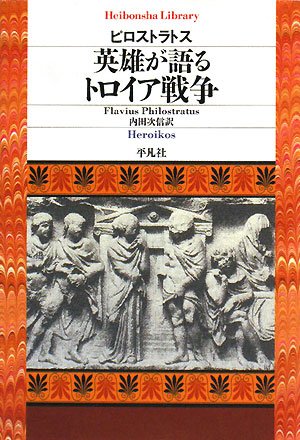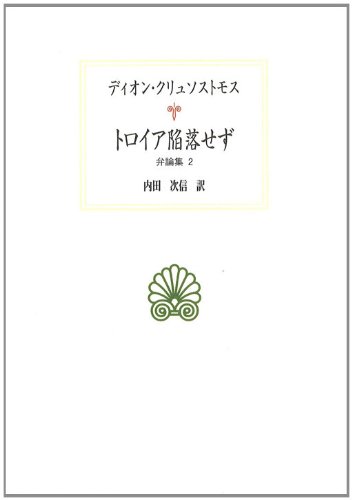4 0 0 0 英雄が語るトロイア戦争
4 0 0 0 IR ディオン・クリュソストモス『トロイア陥落せず』 : 弁論術から歴史フィクションへ
- 著者
- 内田 次信 ウチダ ツグノブ Uchida Tsugunobu
- 出版者
- 文芸学研究会
- 雑誌
- 文芸学研究 (ISSN:13460641)
- 巻号頁・発行日
- vol.14, pp.61-115, 2010-03-31
3 0 0 0 OA オデュッセウスとその妻
- 著者
- 内田 次信
- 出版者
- 京都大学
- 雑誌
- 西洋古典論集 (ISSN:02897113)
- 巻号頁・発行日
- vol.11, pp.62-80, 1994-03-30
この論文は国立情報学研究所の学術雑誌公開支援事業により電子化されました。In the first half of the Odyssey, both the hero's longing for his wife and her attachment to her absent husband are emphasized. This could suggest to the audience that the poet would reproduce the original naive world of the homecomer, but in the second part the hero manifests mistrust of women in general, and would not confide his true self or intention of revenge to his wife. It is only after he successfully fights off the suitors that Penelope acknowledges him as her husband. She was excluded from the fighting but, in the underworld the ghost of a suitor tells of Penelope's assistance to her husband with the plot. Thereupon, Agamemnon praises Odysseus for having Penelope as his wife, which again reminds us of the romantic world of the folk tale. It would have been easier and his victory more certain, if Odysseus had really gotten Penelope's aid, as may have occurred in the original tale. But to Odysseus, who represents the modern man, such a world was alien. The discrepancy between the two worlds creates irony.
3 0 0 0 トロイア陥落せず
- 著者
- ディオン・クリュソストモス [著] 内田次信訳
- 出版者
- 京都大学学術出版会
- 巻号頁・発行日
- 2012
- 著者
- 内田 次信
- 出版者
- 日本西洋古典学会
- 雑誌
- 西洋古典學研究 (ISSN:04479114)
- 巻号頁・発行日
- vol.60, pp.125-128, 2012-03-23
2 0 0 0 IR アリストパネス『アカルナイの人々』における喜劇の力と悲劇
- 著者
- 内田 次信
- 出版者
- 京都大学
- 雑誌
- 西洋古典論集 (ISSN:02897113)
- 巻号頁・発行日
- vol.8, pp.1-41, 1991-12-20
この論文は国立情報学研究所の学術雑誌公開支援事業により電子化されました。Im Gegensatz zur Tragodie steht die Komodie von Anfang an nicht in hohem Ansehen bei den Athenern (vgl. Aristoteles' Poetik, Kap. 5). Die Einstellungen, die die Komodiendichter den Tragikern gegenuber hatten, zeigen komplizierte Aspekte : Wahrend sie Neid bzw. Infe-rioritatskomplex merken lassen, scheuen sich die Komiker nicht, die verwendbaren Elemente der Tragodie zu benutzen, und indem sie sich aus dem Standpunkt der gesellschaftlich Geringgeschatzten parodistisch-kritisch mit der Tragodie auseinandersetzen, bereichern sie die Komodie durch nachahmende und gleichzeitig das Original ubertreffende Gestaltungen, was sie auch zur allgemeinen Anerkennung berechtigt. Dies alles laβt sich auch in den 'Acharnern' des Aristophanes feststellen.
- 著者
- 内田 次信 Uchida Tsugunobu ウチダ ツグノブ
- 出版者
- ギリシア・ローマ神話学研究会
- 雑誌
- 神話学研究 (ISSN:24333964)
- 巻号頁・発行日
- vol.1, pp.2-28, 2017-05-31
Of the two descriptions on the bugonia, the one (G. 4. 284-285, 287-314) characterizes it as a traditional, habitual (284 iam saepe) method, resorted to until today (294 iacit, etc.),and locates its occurrence in Aegyptus (287 Pellaei gens, etc.). It seems to have been an 'orthodox' account about it, told from old by Democritus, Varro, etc. The other (properly 538-558, with preceding accounts 283, 285-286, 315-537) talks of it in a mythological aition (283 inventa, 315 Quis deus hanc … extudit artem, etc.), as occurred in faraway past when Apollo's son Aristaeus 'invented' it. The location is set in Greece, in the beautiful Peneus, which would have itself evoked considerable admiration from the Romans. This description with its mythological time-setting and aura would depend as a whole on Vergilius' invention. Aristaeus, who is bidden to hope for heaven (325, 358sq.), and who miraculously regenerates the bees (metaphor for the Roman people), may be deemed to recall basically Octavianus, who is called upon, as on other passages, in the end of the Georgica. It is an illustration of the mythologic-poetical invention and glorification of the theme, evinced by the poet.
1 0 0 0 IR 生命の燃焼とヘレニストとしての岡先生
- 著者
- 内田 次信
- 出版者
- 京都大学西洋古典研究会
- 雑誌
- 西洋古典論集 (ISSN:02897113)
- 巻号頁・発行日
- pp.129-130, 2001-01-31
この論文は国立情報学研究所の学術雑誌公開支援事業により電子化されました。
1 0 0 0 アリストパネス「平和」のパラバシスについて〔独文〕
- 著者
- 内田 次信
- 出版者
- 京都光華女子大学
- 雑誌
- 光華女子大学研究紀要 (ISSN:0286178X)
- 巻号頁・発行日
- no.25, pp.p81-94, 1987
1 0 0 0 呼びかけるドラマ--アリストパネスとギリシア劇
- 著者
- 内田 次信
- 出版者
- 光華女子大学
- 雑誌
- 光華女子大学研究紀要 (ISSN:0286178X)
- 巻号頁・発行日
- no.38, pp.183-228, 2000-12
1 0 0 0 文学は何のためにあるか--古代ギリシア・ロ-マ人の考えから
- 著者
- 内田 次信
- 出版者
- 京都光華女子大学
- 雑誌
- 光華女子大学研究紀要 (ISSN:0286178X)
- 巻号頁・発行日
- no.19, pp.p68-75, 1981
1 0 0 0 ピンダロスと彼の頌歌
- 著者
- 内田 次信
- 出版者
- 日本西洋古典学会
- 雑誌
- 西洋古典学研究 (ISSN:04479114)
- 巻号頁・発行日
- vol.29, pp.14-28, 1981
Was Pindar "honest" or not in his praises of victors? To answer this question we should deal with each ode separately, for his odes were written for different men, on different occasions. I discuss three cases in this paper(the text used is that of Bowra). First, Isthmian 2. I interpret its proem in line with Farnell and Bowra. The poet is asking Thrasybulos in indirect words for the payment promised, seemingly, by the late Xenocrates in exchange for this ode or the odes including this. Now, the poet's veiled requestruns through the ode. In vv. 23-27, "ανεγνον" and "ασπαζοντο" point, as a preliminary suggestion, to vv. 43-45, where Thrasybulos is required not to reject "these hymns". In vv. 35-42, the long praise of the late father hints, "You, the son, should be equaly hospitable". The poet tries to bring home this hint by quoting his own Pyth.6 (vv. 50 ff.) , an ode which was written to praise the son's filial devotion to the father. Thrasybulos is asked to perform as a dutiful son this Isthm. 2 which celebrates his father's memory. Now, in conclusion in this ode, Pindar's praises of his Standesgenossen are never wholly false on any occasion. In this case, however, we cannot but feel that the words to Thrasybulos(v. 12, 48) are somewhat "cajoling", and that the praise of the father is intended in part as a"tool". Secondly, Ol. 13 and fr. 107. It is argued by Norwood and Meautis that the poet dislikes Xenophon, the receiver of these odes. One of Norwood's points is that Xenophon receives not a word of praise in Ol. 13 except the mere naming of his victories. But, the words of v. 1 or vv. 30-1 serve fully as praise. Moreover, the long praise of Corinth or the Corinthian virtues in vv. 4-23b is not irrelevant, but intensifies as a foil the value of the rare achievement of Xenophon praised in vv. 30-1. In the section after the myths no mention of Xenophon is made(Hamilton, Epinikion 108 n. 5). It is not a mark of Pindar's coldness to Xenophon. Fr. 107 for the hieroduloi is also called to witness by the two scholars. The poet is playful in this fragment through and through. Vv. 1-9 recall to us the Greek "prejudice" about women's lewdness shown mythologically in Teiresias' story. Pindar is jokingly indignant of the license given to the hieroduloi. Vv. 13-15 are also playful. Pindar was doubtlessly embarassed at first by the order of a song for the hieroduloi, but he performed this difficult task with professional sincerity and tact. This is the point of v. 16. To sum up, we probably cannot say Pindar "loved" Xenophon, to be sure, but the argument that Pindar disliked him is out of the question. The fragment shows the smiling attitude of the poet to Xenophon. Finally, Pythian 10. This is one of the most fervent odes of the poet. The twentyyear-old poet, who feels great gratitude(cf. vv. 64-68)to Thorax for receiving an order for a Pythian victory for the first time in his poetic career, and who is filled with hopes of his own future glory, idealizes the aristocratic Thessaly as an aristocrat himself, and compares admiringly its happiness which has now been brought about by Hippocleas' victory with the blessedness of the Hyperboreans. His praise of the Thessalian aristocrats is whole-hearted.
1 0 0 0 IR 『オデュッセイア』の読まれ方(1)
- 著者
- 内田 次信 Uchida Tsugunobu ウチダ ツグノブ
- 出版者
- 大阪大学大学院文学研究科
- 雑誌
- 大阪大学大学院文学研究科紀要 (ISSN:13453548)
- 巻号頁・発行日
- vol.52, pp.151-174, 2012-03
1 0 0 0 IR 宗教と哲学の妄想を笑う : ルキアノスの諷刺文学とファンタジー(その一)
- 著者
- 内田 次信 Uchida Tsugunobu ウチダ ツグノブ
- 出版者
- 文芸学研究会
- 雑誌
- 文芸学研究 (ISSN:13460641)
- 巻号頁・発行日
- no.12, pp.1-29, 2008-03-31
1 0 0 0 IR ヘシオドス、カリマコスとウェルギリウス : 創作理念の系譜
- 著者
- 内田 次信
- 出版者
- 京都大学西洋古典研究会
- 雑誌
- 西洋古典論集 (ISSN:02897113)
- 巻号頁・発行日
- no.3, pp.23-41, 1987-08-31
この論文は国立情報学研究所の学術雑誌公開支援事業により電子化されました。
1 0 0 0 IR エウリピデス『メデイア』における地と天上--新たな狂気の創造
- 著者
- 内田 次信
- 出版者
- 大阪大学大学院文学研究科
- 雑誌
- 待兼山論叢 (ISSN:03874818)
- 巻号頁・発行日
- no.40, pp.1-26, 2006
- 著者
- 内田 次信
- 出版者
- 美学会
- 雑誌
- 美学 (ISSN:05200962)
- 巻号頁・発行日
- vol.60, no.2, pp.170-171, 2009-12-31 (Released:2017-05-22)
1 0 0 0 OA エウリピデス『オレステス』とその間テキスト性
- 著者
- 内田 次信
- 出版者
- 大阪大学
- 雑誌
- 大阪大学大学院文学研究科紀要 (ISSN:13453548)
- 巻号頁・発行日
- vol.48, pp.81-95, 2008-03-31





